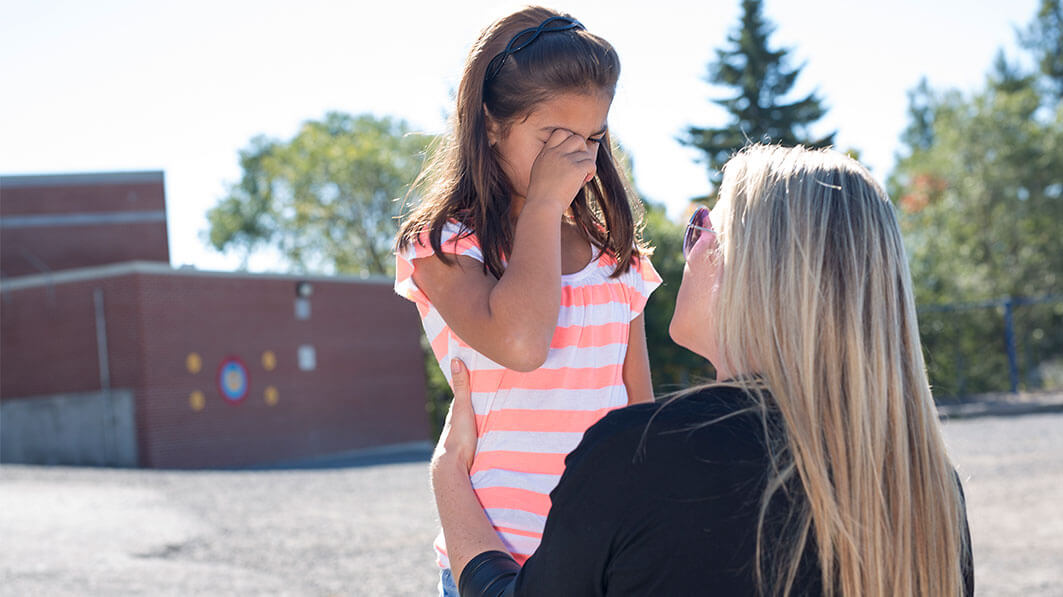Parents can help their kids break out of the bullying cycle.
Kelly didn’t know why three girls chose to make her junior year of high school a nightmare. They began with comments in the hallways and used social media after school hours. Kelly couldn’t go a day without discovering a mean post or comment.
During school, whenever she faced her locker, someone would reach out and pull her hair. Later she’d receive a message on social media: “Yeah, that was me!”
The girls would take photos of Kelly and create cruel “memes” (pictures with captions) calling her a “loser” or “whore!” Many went viral, causing people to laugh at her when she walked by them. In fact, social media amplified every taunt and rumor. The line between bullying and cyberbullying blurred.
When Kelly told her mom, “Everyone hates me,” she literally meant everyone.
Bullying isn’t the same as what it was 20 years ago. Honestly, it isn’t even the same as five years ago. Some of us might remember difficult days in high school — kids being mean. But no matter how tough it was for us socially at school, a bell would ring, and we could escape the cruelty of gossip, insults and sometimes even physical intimidation.
Now when the bell rings, kids leave their campus, but they never escape school’s social world. In fact, they carry a gateway to that world in their pockets.
In 2018, Pew Research released a report titled “Teens, Social Media & Technology.” Today, 95 percent of teens appear to be able to access a smartphone. But only 31 percent of them feel that social media is a positive influence in their lives. Of those who said social media had a negative effect, the main reason they gave was bullying and rumor spreading.
Can Mom and Dad really do anything to help their teens? The answer is yes. And as a kid who was bullied, a parent of a kid who was bullied, and a guy who interviewed hundreds of kids who were bullied, here are some common parenting actions for helping bullied kids heal and find healthy avenues of escape.
Don’t panic
I’ve heard the same story over and over. “I told my mom, and she freaked out!” Or, “I told my parents, and they only made it worse.”
I know it’s hard not to panic when you hear about horrific experiences your teen has had to endure. When I found out what kids were doing to my son during recess, I flirted with the (bad) idea of going to the school and confronting fifth-graders.
But overreaction never helps. We need to turn our overreaction into interaction. When your teen divulges what happened, take a deep breath and don’t panic.
Step into their shoes
When your teen is bullied, he doesn’t need a bodyguard. Instead, he needs someone who is willing to notice what he’s experiencing and listen to his perspective.
As difficult as it may be, avoid doing the following reactions:
- Minimizing the problem and telling him, “Just ignore it.”
- Victimizing or blaming, saying, “Well, what did you do to provoke him?”
- Rushing to fix the problem with a “Just do this . . .”
Instead, practice what every therapist would tell you is the best starting point — empathy. That means creating a climate of comfortable conversation where your teen will want to share with you. And once he does, you don’t need all the answers, you just need him to feel noticed and heard.
You can say, “I don’t know what the solution is, but I’m glad you shared it with me.”
Let him know he isn’t weird to feel hurt and alone — “I’ve felt the same way. Thanks for telling me.”
Affirm him for sharing with you and let him know he’s got someone he can trust who will walk through solutions with him.
Building their identity
Everyone has a strength or gift, something she’s good at. In a world where bullied kids are being told they are “worthless” or a “loser,” it’s good to affirm her in something where she knows she has value.
In fact, help her use her gifting to benefit others. If your teen is good at art, find an opportunity for her to help younger kids in a drawing class. If your teen has the gift of compassion, place her in a situation where she can serve someone in need. Help your child experience the reward of using her skills and talents to make a difference.
Provide positive socialization experiences
Bullying often results in isolation, which hurts a young person’s social skills. Faulty social skills can cause additional isolation. It’s a downward spiral.
Sometimes we can help our kids socially by finding safe social arenas where they feel confident enough to open up and engage in healthy dialogue with others.
I’ve worked with hundreds of kids who were bullied at school. As victims, they were scared to get involved in a church youth group. All teenagers must be mean, these kids would think.
So as a youth group leader I made sure to divide everyone into small groups of just five to eight kids of the same gender. With an effective leader, each teen was given an opportunity to talk, feel noticed and be heard. By year-end, these same shy, awkward teenagers were often dialoguing freely with their peers.
Teens also benefit from socialization with adults. I saw a shy, reserved kid who was teased at school become involved in a soup kitchen ministry with his family. There, he and his brother interacted with homeless adults. His experience was like a conversation “boot camp,” but his confidence increased in social situations in the years to follow. For many kids, social skills and confidence are two of the most effective tools against bullying.
Step in
So far the advice I’ve given has been to be calm, listen and affirm our kids, helping them build confidence in safe venues. These actions earn our teens’ trust to actually step in and help them avoid the problem.
Sixteen-year-old Caleb was getting in fights weekly at school. His parents didn’t jump to conclusions and ground him for fighting. Instead, they sat him down and asked, “What’s going on? How can we help?”
At first Caleb’s answers were, “There’s nothing you can do!” But his parents continued to listen and eventually discovered he was being ruthlessly teased about his last name. The name-calling progressed to pushing and shoving, so Caleb fought back.
“Please don’t make me go back there!” Caleb begged.
His parents said, “Let’s check out our options.”
One week later they enrolled Caleb in another school with a bunch of his church friends, and Caleb thrived.
I know this isn’t a fluke example because my wife and I did the same thing with our son, and the new school was a much better fit for him. I’m not saying relocation is always the answer. But a calm, caring, listening parent can decide when this is a necessary step.
It’s painful to learn that our teens are being bullied and taunted by their peers. The cruel comments kids post on social media have become all too commonplace. But it doesn’t mean our kids need to navigate this journey alone.
Copyright © 2018 by Jonathan McKee. Used by permission.


















 0800 200 362
0800 200 362 support@family.org.nz
support@family.org.nz Rangiora, 7400, New Zealand
Rangiora, 7400, New Zealand